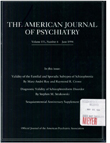Resident physician substance use, by specialty
Abstract
OBJECTIVE: This study compares substance use by medical specialty among resident physicians. METHOD: The authors estimated the prevalence of substance use of 11 medical specialties from a national sample of 1,754 U.S. resident physicians. RESULTS: Emergency medicine and psychiatry residents showed higher rates of substance use than residents in other specialties. Emergency medicine residents reported more current use of cocaine and marijuana, and psychiatry residents reported more current use of benzodiazepines and marijuana. Contrary to recent concerns, anesthesiology residents did not have high rates of substance use. Family/general practice, internal medicine, and obstetrics/gynecology were not among the higher or lower use groups for most substances. Surgeons had lower rates of substance use except for alcohol. Pediatric and pathology residents were least likely to be substance users. CONCLUSIONS: The authors' previous research indicates that residents overall have lower rates of substance use than their age peers in society. Yet resident substance use patterns do differ by specialty. Residents in some specialties are more likely to use specific classes of drugs, to use a greater number of drug classes, and to be daily users of alcohol or cigarettes.
Access content
To read the fulltext, please use one of the options below to sign in or purchase access.- Personal login
- Institutional Login
- Sign in via OpenAthens
- Register for access
-
Please login/register if you wish to pair your device and check access availability.
Not a subscriber?
PsychiatryOnline subscription options offer access to the DSM-5 library, books, journals, CME, and patient resources. This all-in-one virtual library provides psychiatrists and mental health professionals with key resources for diagnosis, treatment, research, and professional development.
Need more help? PsychiatryOnline Customer Service may be reached by emailing [email protected] or by calling 800-368-5777 (in the U.S.) or 703-907-7322 (outside the U.S.).



